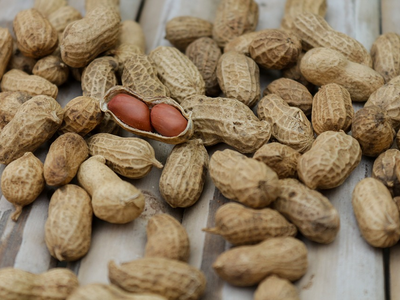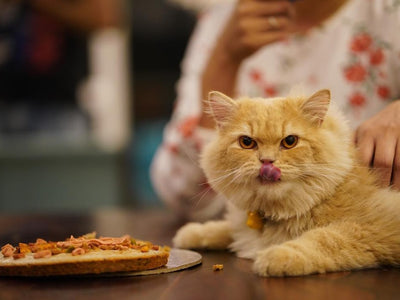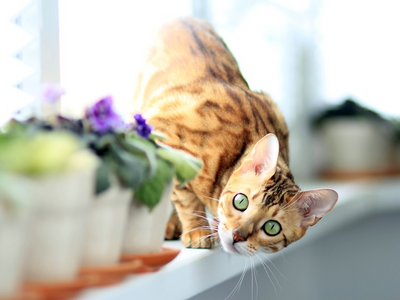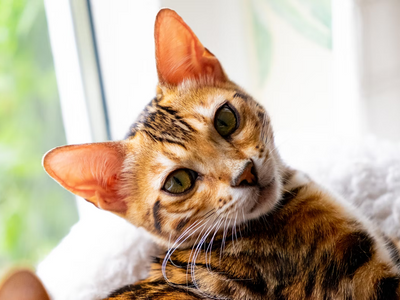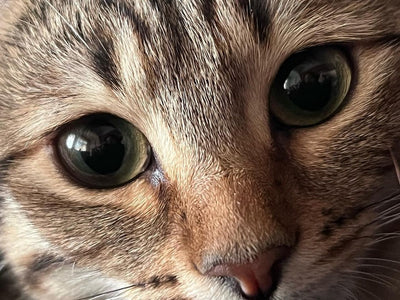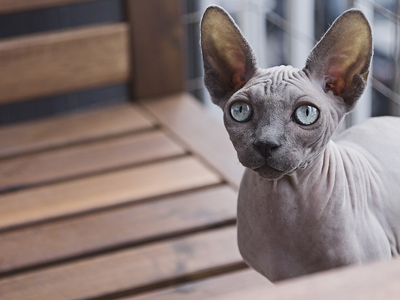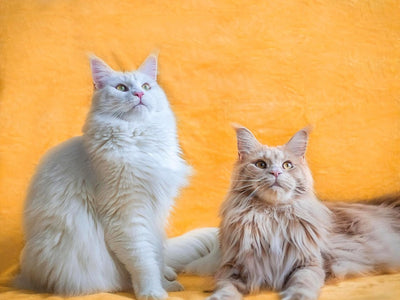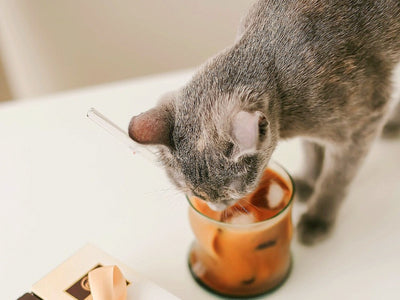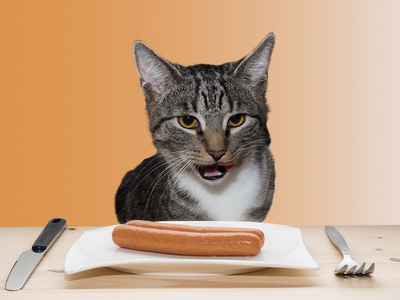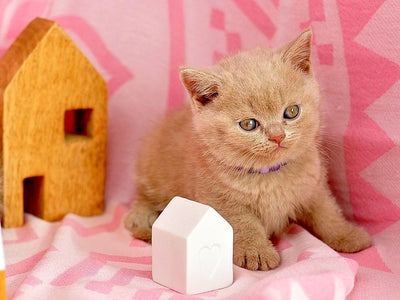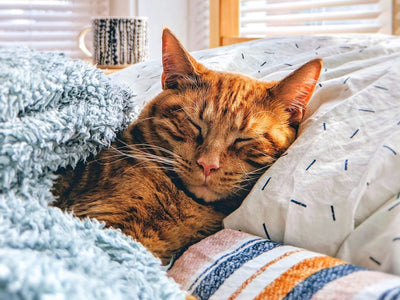27.01.2022
Can cats eat rice, and does it add any nutritional value to their diet?
Can cats eat rice? Most cats aren’t fans of rice, but some felines may be curious to give it a taste. Rice won’t kill your kitty, but that doesn’t mean it’s healthy for them, especially if consumed in large amounts.
Untamed explains what your cat’s meal plan should consist of and tackles the burning questions about your feline friend’s diet. Learn all you need to know about the following:
- Do cats need grains?
- Is rice nutritionally valuable to cats?
- Which dishes with rice are safe for kitties?
- Can rice be bad for cats?
- What other products can you give your cat instead of rice?
- What food should your cat eat to thrive?
Let’s start from the beginning—do cats need grains in their diet?
Cats are obligate carnivores, so their diet should have at least 70% meat. Cats don’t need grains to thrive, and many veterinarians recommend a meat-based diet only. An indoor cat’s diet should resemble the natural feeding habits of their cousins in the wild. Since wild felines tend to eat their whole prey, including bones, muscles, and guts, they get all the nutrients from meat.
Even though cats don’t need grain in their diet, it is not dangerous for them, at least not when eaten in moderation.

Rice is yummy, but is it good for me, hooman?
Source: Wikimedia
Does rice have nutritional value appropriate for felines?
Humans can benefit from eating rice because it is an excellent source of fibre. But how does rice agree with your furry companion? Before we address the not-so-simple question of whether you should give rice to your kitty, we will present its overall nutritional value:
|
Component |
Amount of nutrients in 100 g |
|
Protein |
4.6 grams |
|
Fats |
0.58 grams |
|
Carbohydrate |
41.16 grams |
|
Energy (kcal) |
194.34 grams |
|
Sugars |
0.17 grams |
|
Fibre |
1.42 grams |
|
Calcium |
30.02 milligrams |
|
Iron |
2.86 milligrams |
|
Magnesium |
14.22 milligrams |
|
Phosphorus |
86.9 milligrams |
|
Potassium |
88.48 milligrams |
|
Sodium |
3.16 milligrams |
|
Zinc |
0.58 milligrams |
|
Copper |
0.11 milligrams |
|
Selenium |
14.69 milligrams |
This table shows that rice isn’t nutritionally appropriate for cats. Your feline friend can eat it, but they will not get essential nutrients from rice because the feline digestive system is designed to process meat.
A cat’s diet needs to be focused on animal protein and fat. Carbs and sugar don’t give any useful nutrients to felines and should be avoided because they can cause health issues and obesity. Cats cannot digest plant-sourced protein, so amino acids from plants won’t be absorbed properly. You should keep your kitty’s diet grain-free.
Even though rice is toxic or dangerous for cats, they should consume it occasionally and in moderate amounts.
Your vet might suggest you give rice to your cat if they suffer from diarrhoea because of dietary fibre that can harden the stool. As soon as your furry companion recovers, you should switch them back to a meat diet.
Can cats eat white rice?
Yes, you can give white rice to your cat since it’s processed brown rice. The process involves removing germ, bran, and hull from the grain, making the final product softer and easier to chew. Of all the grains, white rice is easiest for kitties to digest since it’s bland and low in dietary fibre.
Can cats eat brown rice?
You may serve brown rice in small amounts, but keep in mind that brown rice is significantly harder for cats to digest. Although it is rich in vitamin B, iron, fibre, folates, potassium, selenium, and magnesium, your cat’s digestive system won’t be able to absorb any of the nutrients apart from fibre.
Cats should not eat uncooked rice, whether white or brown.
Can cats eat rice cakes?
Yes, kitties can eat rice cakes, but only in moderate amounts. Since rice cakes are made from rice, they’re safe for your feline friend, but they can contain salt or sugar, which may cause stomach upsets.
Rice cakes don’t add any nutritional value to your cat’s diet, so there's no need to include them.
Can you give rice pudding to your furry companion?
Even though white rice is safe for your cat, you should never give them rice pudding because it contains harmful ingredients, such as sugar and milk. These ingredients can be bad for your feline’s health.
It’s not the end of the world if they have a lick or two, but you should not serve rice pudding instead of a regular meal.
Are rice krispies safe for your cat?
Since rice krispies contain sugar and other sweeteners, you shouldn’t give them to your cat. Sugar consumption can lead to diabetes in felines, so sweets are off the table if you want to raise a healthy cat.
Can kittens eat rice?
You should keep rice away from your kitten because it can negatively affect their development. When they start eating food, kittens need animal protein and fat for their growth and development, and rice doesn’t have an adequate nutritional profile.
Food for kittens needs to be high in protein to enable proper muscle, bone, and nervous system development. The food with the perfect nutritional profile are their mother’s milk, kitten milk replacers (KMR), and high-quality meat products.

Rice can be excellent for hardening your kitty’s stool, but make sure it’s given in moderation.
Source: Pille R. Priske
Can rice be bad for cats?
Yes, rice can cause problems for your kitty, so keep the following in mind:
- Never feed your cat uncooked or partially cooked rice—Uncooked rice is exceedingly difficult for cats to digest, and it can cause gas, bloating, abdominal pain, and gastrointestinal issues. It can also contain lectin, a natural pesticide that causes nausea, vomiting, and diarrhoea
- Don’t go overboard with rice—Basing your feline diet on rice may cause taurine deficiency. Taurine is an important amino acid for cats, and it can only be found in animal protein
- Your kitty might be sensitive to grain—If your feline friend isn’t accustomed to eating grains, it’s best if you don’t experiment with rice. Rice may cause vomiting and constipation in sensitive cats
- Rice can cause obesity—Since rice is rich in carbs, your cat can gain weight quickly, especially if they’re neutered. Being overweight entails many health issues, such as diabetes, heart disease, high blood pressure, irritable bowel syndrome (IBS), gastrointestinal issues, hormone imbalances, and kidney disease
- Rice with seasoning can be toxic—If you decide to serve some rice, make sure it’s plain because seasoning like salt, garlic, onions, or other allium vegetables are highly toxic to cats
How to safely feed rice to your kitty
If your cat is crazy about rice, you can serve it as a dessert. To make the treat safe, follow these rules:
- Cook the rice properly
- Don’t season it (avoid putting spices like salt, onions, garlic, and others)
- Give your kitty only a small amount of rice
- Serve it once a week max
If your cat suffers from diarrhoea and the vet prescribes rice during that period, you can include it in their meals until they get better. Even then, it shouldn’t exceed 25% of their daily food intake.
Are you giving rice to your kitty for the first time? Pay attention to allergic reactions
If you’re feeding your furball rice for the first time, you should be careful about potential allergic reactions. Start with the tiniest amount, not more than 10 grams. Monitor their behaviour and reaction.
If they exhibit any of the following, consult your veterinarian immediately:
- Vomiting
- Sneezing and coughing
- Watery, red, or itchy eyes
- Skin rash or hives
- Facial pain

Waiting for my food, but please let it be anything but rice!
Source: Paul Hanaoka
What must a cat’s diet contain?
As obligate carnivores, cats should eat meat to get the necessary amino acids and nutrients. Their diet must contain:
- Animal protein
- Animal fats
- Vitamins and minerals
Animal protein
Your cat will have a strong heart, good vision, efficient immune response, and a healthy reproductive system if their diet is rich in animal protein. Meat has appropriate amino acids like taurine and arginine, vital for muscles, ligament, and tissue development.
The table below shows the bioavailability of different protein sources:
|
Protein source |
Biological value |
|
98% |
|
|
Tuna, salmon, sardines, and prawns |
94% |
|
Liver |
92% |
|
87% |
Animal fats
Animal fat is another viable energy source for cats, and it makes the food taste delicious. It also provides essential fatty acids, such as:
- Linoleic acid
- Arachidonic acid
- Omega-3 and omega-6
Fats help regulate inflammatory responses and maintain cell membrane structure. With the right amount of animal fat in their food, you won’t have a problem getting your cat to eat.
Vitamins and minerals
Besides vitamins C and K, which they can synthesise, cats get other vitamins and minerals from their food. Check what other vitamins your cat needs and what the sources of these micronutrients are:
|
Vitamins |
Source |
|
Vitamin B12 |
|
|
Vitamin A |
|
|
Vitamin E |
|
|
Vitamin D |
|
Your cat's meals must also contain the following minerals:
- Zinc
- Magnesium
- Calcium
- Phosphorus
All essential micronutrients are available in meat and fish, so there's no need to add rice, bread, vegetables, or fruit to your kitty's diet.

Dry cat food is best when combined with semi-moist or wet cat food.
Source: Lucas Pezeta
Is dry food enough for your furry friend?
Dry food is heavily processed. In most cases, cat kibble is packed with starch and grain, so the carb content is inadequate for cats. Calorie surplus and taste enhancers in dry food can cause obesity, heart disease, diabetes, hypertension, and other health issues.
Kitty biscuits can also cause dehydration because of the low moisture content. Dehydration can lead to serious health issues, such as urinary and digestive tract problems, including cystitis, bladder stones, struvite crystals, and IBS. Semi-moist and wet food are superior alternatives.
Cat biscuits aren’t all bad. They are usually more affordable than wet food and can contribute to your cat’s dental health. Some veterinarians say that dry kibble can scrape the excess plaque off your furry friend’s teeth.
If you still opt for biscuits, combine them with high-quality wet food because food with gravy and jelly will provide the necessary moisture. You can also dip dry food in cat soup or broth to soften it for kitties with teeth problems.

Untamed cat food has all the essential nutrients your furball needs!
Source (c) Untamed
Why is Untamed the safest food for your furry friend?
Untamed products are tasty, healthy, and well-balanced. Our food contains human-grade whole meats instead of iffy meat derivatives most brands use.
Our dishes are also:
- High in protein—Untamed food contains twice as much protein as the industry standard
- Approved by even the fussiest of kitties—Untamed food is tasty, and it will satisfy the palate of all finicky felines
- Gently steamed to preserve all nutrients—We steam-cook our food using vet-formulated recipes to make hypoallergenic and healthy meals for your cat
- Ethically produced—We get our ingredients from sustainable and cruelty-free suppliers, and our packaging is 100% recyclable
Our products are safe for cats of all ages and breeds—kittens, adults, and seniors, whether they’re Persians, Siamese, Bengals, Maine Coons, Ragdolls, or British Shorthairs, thrive on Untamed.
Since our food is moist and soft, it is also safe for toothless furballs. Even if your feline friend doesn’t eat wet food, Untamed is tasty enough to make them change their mind. Take our TRY NOW quiz to get a starter pack at the best rate.

We will deliver your taster box within a day!
Source (c) Untamed
How to order your first Untamed starter pack
To organise the first Untamed feast for your kitty, go to our online cat food store and follow these straightforward steps:
- Complete our questionnaire
- Select a meal plan
- Place your order
We will send a starter pack to you within a day. We’ll continue replenishing your stock around the same date each month.
You can modify the specifications of your monthly cat food subscription at any time.
Cat parents’ reviews of Untamed
Cat parents are happy with Untamed, and this is what they say about the Untamed effect:
|
Time using Untamed |
Effect Untamed had on their furballs |
|
Seven days |
|
|
Three months |
|
|
Six months and beyond |
|
Are there safer alternatives to rice?
If you are set on sharing your food with your cat, consider other products that are safe for your furry friend and won’t cause problems in the long run. Meat snacks are the best for your feline, but the following fruits and veggies shouldn't cause trouble if given occasionally:
|
Vegetables |
Fruits |
|
|
Keep in mind that your cat won't be able to absorb the essential nutrients from plants, so if they need additional vitamins and minerals in their diet, consult your vet for professional advice. You will probably have to add supplements or tailor-made food for felines in the case of any nutrient deficiency.

Can I eat apples instead of rice, please?
Source: raissameres
Which fruits and veggies should your cat never eat?
Cats should never eat the following fruits and vegetables:
- Onions
- Garlic
- Avocado
- Citrus fruits, such as lemons, limes, and oranges
- Persimmon
- Cherries
- Coconut
- Rhubarb
- Root and stem vegetables
- Wild mushrooms
- Grapes and raisins
- Raw tomatoes and green potatoes
Unlike rice, the fruits and veggies from this list can harm your cat, so keep them out of paw’s reach. If your kitty manages to have a taste, take them to the vet immediately.
Other no-no products for felines
The following items are also pretty dangerous for your furry friend:
- Dairy products—It is a little-known fact that most cats are lactose-intolerant. They cannot process the ingredients in milk and cheese and can have severe allergic reactions to a milk protein called casein
- Cocoa products—Any product containing cocoa can provoke allergic reactions, including:
- Cocoa powder
- Milk chocolate
- Dark chocolate
- Cooking chocolate
- Coffee—Cats are sensitive to caffeine, so one or two licks of coffee, and they’ll be hyperactive. Caffeine is also highly toxic and may cause vomiting, diarrhoea, and other gastrointestinal issues
- Alcohol—Alcohol is super dangerous for kitties as it can cause diarrhoea, vomiting, depression, lack of coordination, trouble breathing, and even death
- Dough and food containing raw yeast—Yeast can lead to severe bloating if it starts fermenting inside your furball's stomach. It also produces alcohol which can lead to liver damage and death

Raw food can be dangerous to cats because of the potentially harmful bacteria.
Source (c) Untamed
Don’t feed raw food to your feline friend
Uncooked rice is bad for your feline companion, but cats shouldn’t eat any kind of raw food because it can contain harmful bacteria, such as salmonella, listeria, and E. coli. These bacteria can often be found in:
- Raw fish
- Raw eggs
- Raw chicken and other meat
Even though it might seem sensible to feed raw food to your cat as it is the closest to what they would eat in the wild, it's a far cry from the fresh prey they would catch in their natural habitat. Raw meat from the human food supply chain is often frozen and kept stored for a long time, making it susceptible to pathogens.
If you’re thinking about transferring your cat to a B.A.R.F. diet, you should get informed about the protocols related to it.
Check out our other guides to what cats can or cannot eat:
|
|

![Associated image for What human food can Sphynx cats eat? [Comprehensive list]](http://untamed.com/cdn/shop/articles/what_human_food_can_sphynx_cats_eat_Featured_400x300_crop_center.jpg?v=1648705074)
